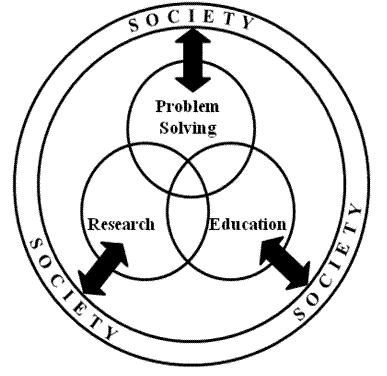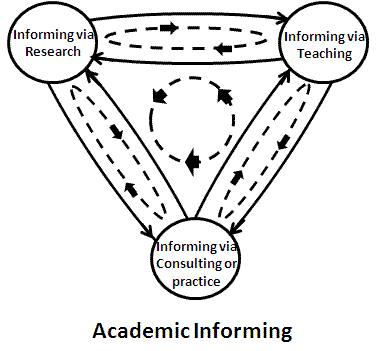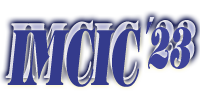|
Special Track on
Integrating Research, Education, and Problem Solving: IREPS 2023 |
|
The Special Track on Integrating Research, Education, and Problem Solving: IREPS 2023 id to foster the integration of academic activities by means of organizing a forum of academics who:
- Present means and ends of this kind of integration, i.e. why it is important and how it might be achieved. This include reflection or exploration related to the synergies that might emerge from this kind of integration
- Present the way in which any two of the academic activities, or the three of them, have been, or might be, related in a given discipline. This might generate analogical thinking oriented to how to achieve similar relationships in other disciplines.
- Describe specific real life cases where two of the fundamental academic activities, or the three of them, have been related.
- Proposing or describing specific or general methodologies for relating any academic activities
- Propose or describe organizational academic incentives oriented to foster the identification of different way for relating academic activities and/or to foster the praxis of this kind or relationships oriented to the integration of academic activities.
- Propose or describe different ways, or specific cases, of relating academy and Industry, or with the private and/or the public sector.
Submissions on any topic related to the above described main purpose, are welcomed, including case studies, used or proposed methodologies, reflection-based articles oriented to the importance of integrating any academic activites, reflections oriented to the potential synergies that might emerge from this kind of integration, description of the potential cybernetic loops that might present when implementing relationships among academic activities, etc.
There is a growing academic and societal need for the integration of academic activities among themselves and with Society, including private and public sectors. An increasing number of academics have noticed the importance of integrating Research, Education, and Problem Solving among themselves and with societal and corporate real life problems. Information and Communications Technologies enabled different ways of supporting these kinds of integration processes. Informing Science is at the heart of academic activities (research, education, and consulting).

Based on Eli Cohen's seminal paper1, Informing Science has evolved into an important and useful trans-discipline, and T. Grandon Gill2 applied this emerging trans-discipline in the context of a detailed critical analysis of the academic activities in Business Schools, and made very important suggestions for the design (or re-design) of this academic field. Gill's analysis and design recommendation are also important for other academic fields especially those related to professional activities like Engineering, Medicine, Scientific Consulting, problem oriented research, action research, etc. Cohen's and Gill's seminal works inspired the organization of the Special Track on Integrating Research, Education, and Problem Solving: IREPS 2023.
IREPS 2023's Organizing Committee preferred to also include the engineering perspective to the content of the special track because of the very important complementary, synergic, and cybernetic relationships between Science and Engineering3, in general, and especially in the specific case of Academic Informing. Information Systems Engineering, along with soft engineering4, organizational engineering and an increasing number of non-traditional fields in engineering (along with the experience in research, teaching and consulting in traditional engineering fields) are highly desirable, if not necessary, for designing and implementing processes and support technologies related to new findings and new ways for integrating the academic activities (research, education, consulting, and problem solving) among themselves and with Society, including the Private and the Public Sectors.
IREPS 2023 is oriented to academics and their clients: researchers, students, and practitioners. Contributions are accepted regarding the three basic academic informing activities, especially those related to relationships among them. As it is known, cybernetic loops among the basic academic informing activities can provide co-regulative processes (via negative feedback and feedforward) and synergic co-amplifying processes (via positive feedback). Two-way informing between any two of the three basic academic informing activities would make possible the required cybernetic loops.

Research is a basically a two-phase informing process, which include informing oneself and informing other researchers with regards to the newly found knowledge, solution, problem, hypothesis, theories, methodologies, design, etc. Research can also be conducted with regards to research (meta-research), teaching processes, and consulting or reflective practice. T. Grandon Gill, based on his intellectual stature as researcher, and large academic experience, affirms that “consulting is research [and] offers the researcher one of the most effective channels from achieving impact.”5 The real impacts of academic activities are also to be found in the students and practitioners, in teaching and consulting, not just in research via citation index. Academic effectiveness depends on research impact on other researchers, students, and practitioners. It depends on the solution of problems formulated by other interested parties and not just on self-formulated disciplinary problems. Both kinds of problems complement synergistically each other. This kind of synergy is especially important in the academic effectiveness of professional schools (e.g. traditional and non-traditional engineering, business administration, medicine, education, informatics, informing sciences, informing engineering, etc.), applied sciences schools and scientific research supported by community service organizations and tax payers based grants.
In general, Informing Science and Informing Engineering complement each other synergistically. Implicit or explicit cybernetic loops between science and engineering have been producing co-regulating and co-amplifying reciprocal relationships for many years6. In our opinion, the more explicit we make the differentiation and the relations between science and engineering, the larger are their effectiveness and the impact of each one. This is especially in the area of Academic Informing. This is why we prefer to make it explicit that IREPS 2023 is oriented to both Academic Informing Science and Academic Informing Engineering, as well as to the relationships between them.
Consequently, IREPS 2023’s Organizing Committee is accepting submissions 1) in any of the three academic informing activities, as well as on their existing or potential relationships, and 2) from a scientific, engineering, or integrative perspective.
The purpose of IREPS 2023’s Organizing Committee is to bring together academics concerned about the impact and effectiveness of their activities to share their academic experience with regards to this issue. Many academics from different disciplines have had academic experiences and concerns similar to those expressed by T. Grandon Gill in his book and articles with regards to Business Schools. Consequently, it is academically beneficial to organize a forum where these kinds of concerns and possible solutions can be shared among different disciplines from different perspectives and to allow interdisciplinary communication with regards to this trans-disciplinary academic problematique.
Notes
1. Eli cohen, 1999, “Reconceptualizing Information Systems as a Field of the Discipline Informing Science: From Ugly Duckling to Swan,” Journal of Computing and Information Technology, 7 (3), pp. 213-219; re-published in T. Grandon Gill and Eli Cohen (Eds.), 2009, Foundation of Informing Science: 1999-2008; Santa Rosa, California, Informing Science Press, pp. 7-12.
2. T. Grandon Gill, 2010, Informing Business: Research and Education on a Rugged Landscape; Santa Rosa, California, Informing Science Press
3. Details regarding this issue were included in N. Callaos, 2008, The Essence of Engineering and Meta-Engineering at www.iiis.org/Engineering-and-Meta-Engineering.
4. Soft engineering is “based on symbiotic coexistence of human, machines and environment” (Joongsun Yoon, 2004, “Robotics projects based on soft engineering,”, IECON 2004. 30th Annual Conference of IEEE Industrial Electronics Society, 2-6 Nov. 2004, pp. 3160 – 3165, Vol. 3
5. T. Grandon Gill, 2010, op. cit., p. 485
6. Details regarding this issue can be found in N. Callaos, 2008, op. cit.
Organizational Issues, Reviewing, and Selection of Best Papers Policies
Technical Keynote Speakers
Technical keynote speakers will be selected from early submissions because this selection requires an additional evaluation according to the quality of the paper, assessed by its reviewers, the authors' CV and the paper's topic.
Reviewing Process
All Submitted papers/abstracts will go through three reviewing processes: (1) double-blind (at least three reviewers), (2) non-blind, and (3) participative peer reviews. These three kinds of review will support the selection process of those papers/abstracts that will be accepted for their presentation at the conference, as well as those to be selected for their publication in JSCI Journal. Details regarding this subject can be found at www.iiis-spring.org/imcic/waysofparticipation.asp
Details regarding the Acceptance Policy can be found at https://www.iiis-spring23.org/imcic/Website/AcceptancePolicy.asp
Authors of accepted papers who registered in the conference can have access to the evaluations and possible feedback provided by the reviewers who recommended the acceptance of their papers/abstracts, so they can accordingly improve the final version of their papers. Non-registered authors will not have access to the reviews of their respective submissions.
Virtual Participation
Submissions for Face-to-Face or for Virtual Participation are both accepted. Both kinds of submissions will have the same reviewing process and the accepted papers will be included in the same proceedings.
Pre-Conference and Post-conference Virtual sessions (via electronic forums) will be held for each session included in the conference program, so that sessions papers can be read before the conference, and authors presenting at the same session can interact three days before and during the conference, as well as up to three weeks after the conference is over. Authors can also participate in peer-to-peer reviewing in virtual sessions.
Invited Sessions Organizers
Registration fees of an effective invited session organizers will be waived according to the policy described in the web page (click on 'Invited Session', then on 'Benefits for the Organizers of Invited Sessions'), where you can get information about the ten benefits for an invited session organizer. Yo propose the organization of an Invited Session, please visit the conference website, or directly to https://www.iiis-spring23.org/imcic/Organizer.asp
Best Papers
Authors of the best 25%-30% of the papers presented at the conference (included those virtually presented) will be invited to adapt their papers for their publication in the Journal of Systemics, Cybernetics and Informatics.
One best paper of each session included in the program will be selected by the respective session’s co-chairs after consulting with the session’s audience. Invited Sessions organizers will select the best paper of the session they organized. If there is a tie in a given session, the paper that will be selected as the best session’s paper will be the one which have had the highest quantitative evaluations average according to its double-blind and non-blind reviews.
The selection process of the best 25%-30%, to be also published in the Journal, will be based on the sessions' best papers and the quantitative evaluation average made by its anonymous and non-anonymous reviewers. The later will be applied to papers which acceptance was based on reviews made to draft papers. Reviews of abstracts and extended abstracts will not be valid for selecting best papers according to the quantitative evaluation of the respective submissions. |

